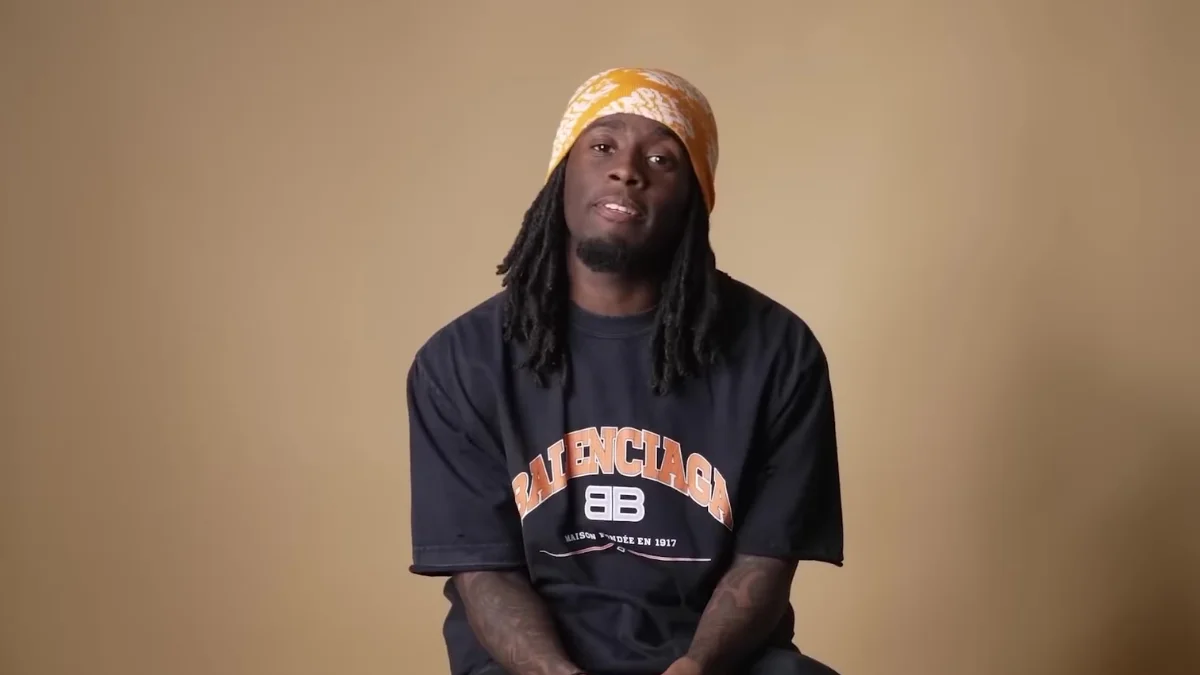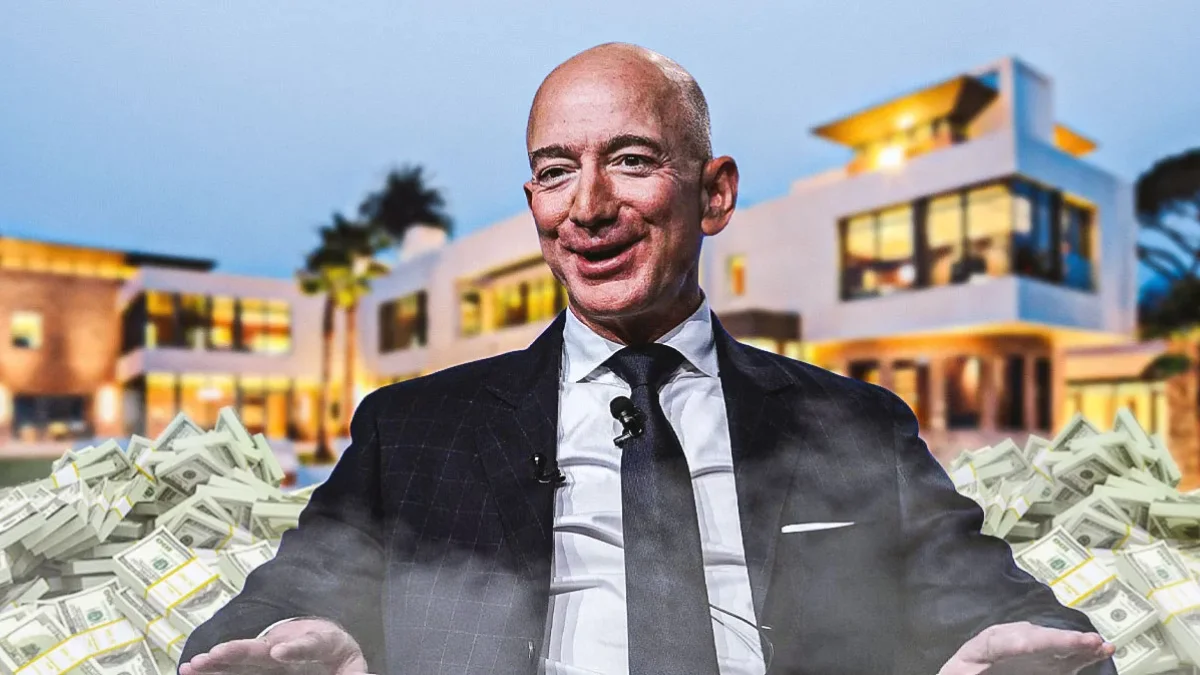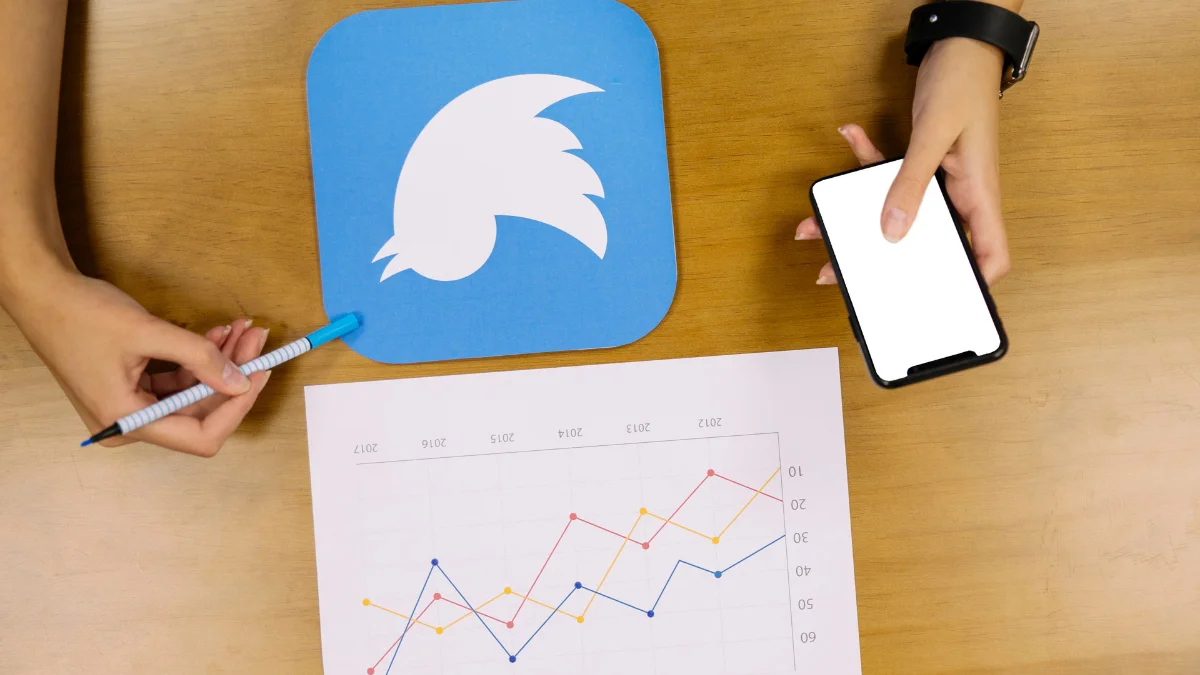University career fairs are exciting opportunities for students to meet potential employers. They create a bridge between college life and the professional world. Many students, however, feel unsure about how to prepare or behave at these events. In this guide, Mariano Iduba shares practical tips to help you stand out and make a lasting impression at university career fairs.
What Are University Career Fairs?
University career fairs are organized events where students connect directly with recruiters and hiring managers. These events are often hosted on campus or virtually to help students explore jobs and internships. They allow companies to meet fresh talent and build relationships with universities. Whether in-person or online, these fairs are vital for launching successful careers.
Purpose and Benefits of Career Fairs
The main purpose of a university career fair is to connect education with real-world opportunities. Students get the chance to learn about industries and meet employers face-to-face. Employers benefit by finding enthusiastic and skilled candidates. For universities, these fairs strengthen partnerships with organizations and improve employment outcomes for graduates.
Types of University Career Fairs
There are several types of university career fairs depending on their focus. Some are general fairs that include employers from various industries. Others are specialized, such as engineering or business fairs, focusing on specific disciplines. Virtual and hybrid career fairs have also become popular, giving students flexible ways to attend and connect with recruiters online.
Who Participates in Career Fairs
A variety of people attend these events, making them dynamic and diverse. Students come to learn, ask questions, and network with professionals. Recruiters and company representatives attend to find talent and promote their organizations. Career advisors and university staff support students during the process. This mix of participants creates a valuable learning experience for everyone.
How University Career Fairs Are Organized and How They Work
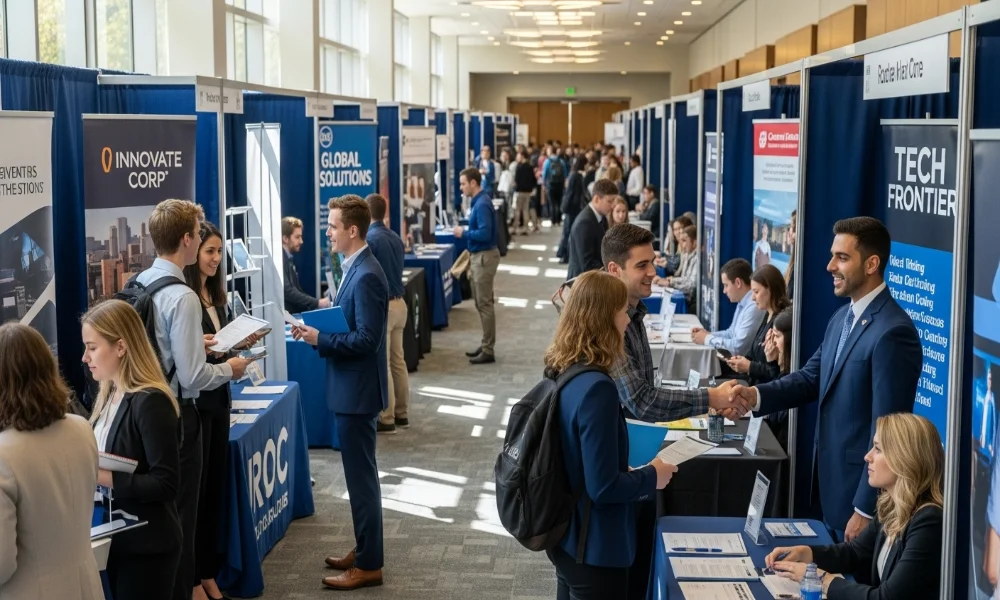
University career fairs are carefully planned by career services departments months in advance. They coordinate with employers, arrange booth spaces, and promote the event to students. During the fair, employers set up displays to showcase their company culture and open positions. Virtual fairs use online platforms where students can upload resumes, chat, or video call recruiters directly.
Roles of Stakeholders
Career services teams act as event coordinators and ensure smooth execution. Employers prepare brochures, banners, and materials to attract candidates. Students research companies and practice their introductions before the event. Everyone plays a part in making the fair meaningful and successful. Good collaboration ensures the event benefits all participants.
Metrics for Success
Universities often measure success by tracking attendance and student satisfaction. Employers look at the number of qualified candidates they meet. Students define success by the contacts they make or interviews they secure. Collecting feedback after the fair helps improve future events. The true measure of success is how well it connects talent with opportunity.
Before the Fair: Preparation Steps for Students
Preparation is key to making a strong impression at university career fairs. Start by checking the list of participating employers on your university’s website. Research their values, goals, and current job openings. Create a prioritized list of companies you want to meet. Being informed helps you ask smarter questions and engage confidently.
Research and Strategy
Thorough research can set you apart from other students. Learn about each company’s mission, culture, and current projects. Prepare a short list of three to five employers that match your interests. Plan your route to visit those booths first. Strategy and preparation show initiative, which recruiters always appreciate.
Resume and Materials
Bring several copies of your updated resume printed on quality paper. Make sure your LinkedIn profile matches your resume information. Some fairs allow digital uploads, so have PDF versions ready. Include a short personal summary at the top of your resume. This helps recruiters remember you even after the event ends.
Dress and Mindset
First impressions matter, and professional attire can boost confidence. Choose neat, business-casual clothing that fits well. Smile, maintain eye contact, and stay positive throughout the event. A calm and confident attitude shows recruiters that you are serious and prepared. Remember, enthusiasm is just as important as qualifications.
During the Fair: How to Engage and Stand Out
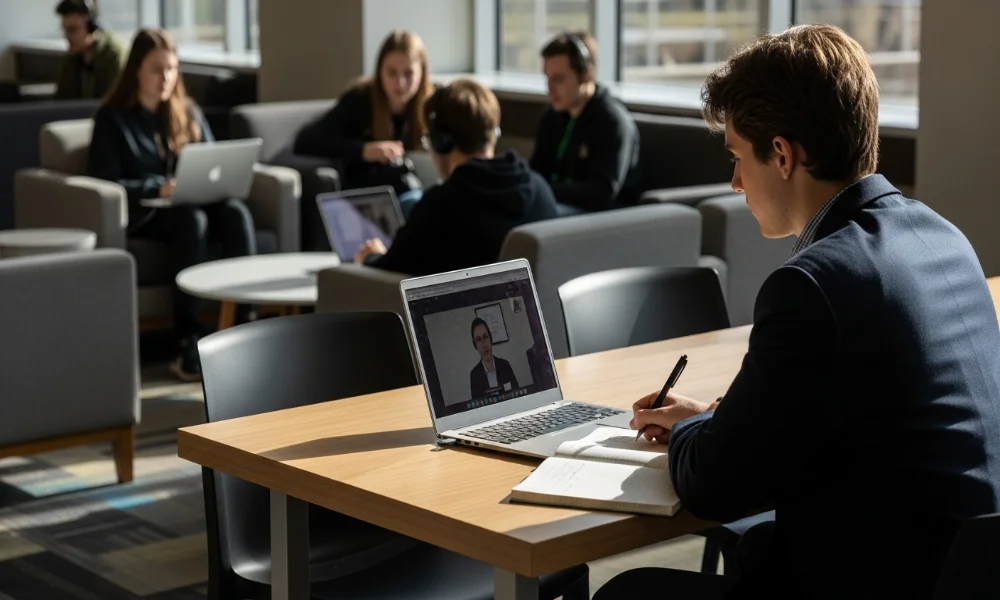
Once at the fair, focus on quality conversations rather than visiting every booth. Start by approaching your top-choice companies early in the day. Greet recruiters politely and introduce yourself with a firm handshake. Use your elevator pitch to summarize who you are and what you’re looking for. Always show curiosity and genuine interest in the company.
Smart Questions to Ask Recruiters
Asking thoughtful questions helps you stand out from the crowd. Instead of generic queries, focus on topics that show preparation. Ask about skills they value or how their recruitment process works. Below is a table of strong and weak questions you can use as a guide.
| Strong Questions | Weak Questions |
|---|---|
| “What skills do you value most in interns?” | “What does your company do?” |
| “How does your firm support graduate development?” | “Do you have any jobs?” |
| “Can you share what makes top performers stand out?” | “How much do you pay?” |
Body Language and Communication
Your nonverbal communication can say as much as your words. Stand straight, smile, and maintain eye contact while speaking. Avoid fidgeting or crossing your arms, as it may signal discomfort. Listen carefully to recruiters and respond thoughtfully. Clear and respectful communication creates a lasting impression.
Networking and Follow-Ups
Exchange contact details or connect with recruiters on LinkedIn immediately. Make short notes about what you discussed with each recruiter. This helps personalize your messages later. Before leaving, thank them sincerely for their time. Good manners and follow-up gestures often lead to lasting professional connections.
After the Fair: Follow-Up and Relationship Building
Your efforts should not stop once the event ends. Following up with recruiters is a crucial step many students forget. Send a short thank-you email within two days of meeting them. Mention your conversation and express your continued interest. A polite and personalized message shows professionalism and initiative.
Sample Follow-Up Email Template
| Element | Example |
|---|---|
| Subject | “Great to meet you at the University Career Fair” |
| Greeting | “Dear [Recruiter Name],” |
| Message | “It was great meeting you at the career fair yesterday. I enjoyed learning about [company name] and your work in [specific field]. I’m very interested in applying my [skills] to future opportunities with your team.” |
| Closing | “Best regards, [Your Name]” |
Long-Term Networking
Stay connected with recruiters through LinkedIn or professional events. Engage with their company’s content by liking or commenting thoughtfully. You can also send occasional updates on your academic progress. Networking is a long-term investment in your career. The relationships you build now can open doors in the future.
Mariano Iduba’s Insider Tips and Strategies
Mariano Iduba believes that preparation and personality are key to success at career fairs. He encourages students to treat each interaction like a mini interview. Before the fair, research recruiters on LinkedIn to find shared interests or connections. Personal touches like this can make your approach memorable.
Mariano’s Top Five Tips
| Tip | Description |
|---|---|
| 1. Be proactive | Approach recruiters confidently instead of waiting to be approached. |
| 2. Show authenticity | Speak naturally and avoid sounding rehearsed or robotic. |
| 3. Bring digital business cards | It’s a modern, eco-friendly way to share your details. |
| 4. Tell mini success stories | Share brief examples that highlight your skills and results. |
| 5. Connect online immediately | Add recruiters on LinkedIn while the conversation is fresh. |
Mindset for Success
Iduba emphasizes that success begins with mindset and confidence. Practice your introductions with friends before the fair to build comfort. Focus on curiosity rather than perfection. Recruiters remember candidates who ask smart questions and show eagerness to learn. Confidence paired with humility always leaves the best impression.
Virtual and Hybrid University Career Fairs
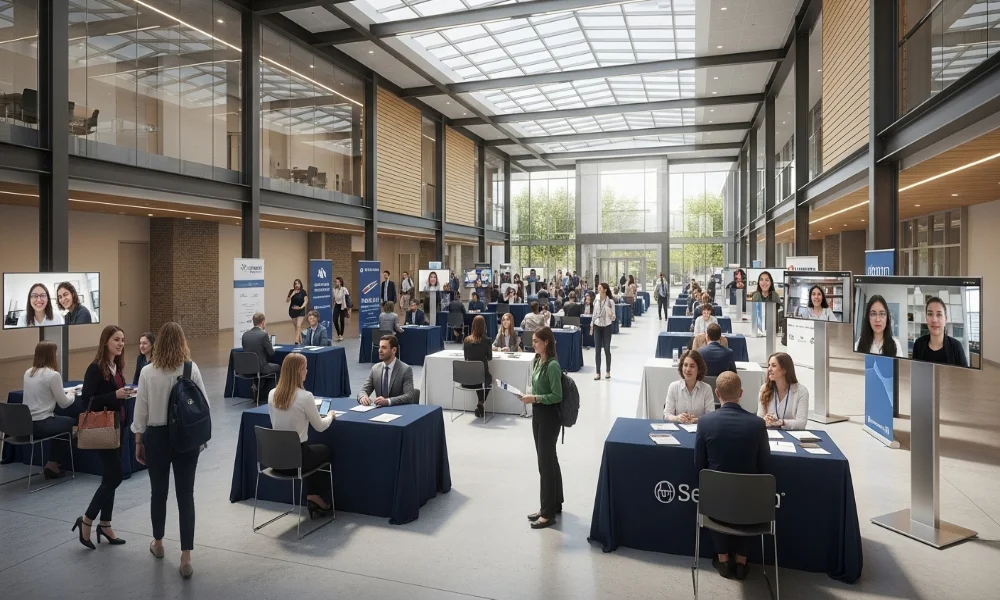
Virtual and hybrid career fairs have become increasingly popular since remote work expanded worldwide. Because technology now connects people across borders, these events allow students to meet global employers without ever leaving campus. Moreover, they take place on secure online platforms where participants can attend live sessions, explore company booths, and chat directly with recruiters.
Although they differ from traditional in-person fairs, they still provide equal opportunities to make strong impressions. In fact, when students understand the meaning of career, they can approach these events with purpose and confidence. Therefore, they learn to present themselves effectively, showcase relevant skills, and express genuine curiosity about future roles.
Since many organizations now hire remotely, attending virtual fairs helps bridge the gap between education and employment. Furthermore, it builds professional networks that might have been impossible before. However, success requires preparation polishing résumés, researching employers, and practicing clear communication. While some may miss face-to-face interaction, hybrid fairs combine both digital convenience and human connection.
Consequently, students gain flexibility, accessibility, and exposure to diverse industries. Through careful planning and active participation, they can stand out globally. Thus, virtual and hybrid career fairs are not just events; instead, they represent new pathways to opportunity. Ultimately, they remind us that careers evolve constantly — and adaptability is the key to long-term success.
Best Practices for Virtual Fairs
Always test your camera and microphone before joining a virtual fair. Choose a clean, quiet background and ensure good lighting. Dress professionally, just like you would for an in-person event. Keep your resume ready to share via chat or email. Being prepared technically makes your interaction smoother and more professional.
Maximizing Virtual Engagement
Log in early to catch orientation sessions or company introductions. Take notes about the employers that interest you most. Ask questions during live chats or webinars to show engagement. Stay active in networking lounges and breakout rooms. Virtual fairs may be online, but genuine enthusiasm still shines through.
Common Challenges and How to Overcome Them
Many students feel anxious or overwhelmed at their first career fair. Preparation helps reduce stress and improves performance. Practice your pitch and review company profiles the night before. Arrive early to avoid rush and long lines. The more you prepare, the more confident you’ll feel during conversations.
Handling Rejection Gracefully
Not every recruiter will respond with enthusiasm, and that’s normal. Stay polite and thank them for their time regardless of the outcome. Treat each interaction as practice for the next one. Every conversation improves your communication skills. Persistence and professionalism will pay off over time.
Staying Organized
Keep a small notebook or digital spreadsheet to record your meetings. Write down company names, recruiter contacts, and notes from each talk. This helps you personalize your follow-up messages later. Staying organized saves time and ensures you never miss a valuable connection.
Sample Timeline and Checklist
| Timeline | Action Items |
|---|---|
| 4 Weeks Before | Research companies and register for the fair. |
| 2 Weeks Before | Update your resume and craft your elevator pitch. |
| 1 Week Before | Practice questions and review company profiles. |
| Day Before | Plan your outfit, print resumes, and rest well. |
| Event Day | Engage confidently and collect recruiter details. |
| After the Fair | Send thank-you emails and connect on LinkedIn. |
Following this simple timeline helps you stay focused and well-prepared at every stage.
FAQ
What should I bring to a university career fair?
Bring multiple resumes, a pen, a notebook, and a confident attitude.
How do I follow up after a career fair?
Send a thank-you email within two days mentioning your conversation and interest.
Can virtual career fairs help me get a job?
Yes, virtual fairs often lead to interviews and internship opportunities.
Conclusion
University career fairs are valuable opportunities for students to connect with future employers and explore diverse career paths. When approached strategically, these events can open unexpected doors because preparation and confidence make a lasting impression. However, success doesn’t come by chance; it grows through deliberate research, thoughtful interaction, and timely follow-up. Although each conversation is brief, it can become a long-term professional opportunity if handled with sincerity and focus.
Moreover, students can strengthen their approach by understanding current industry trends and exploring top career paths in 2025, which offers insight into evolving job markets and essential skills. In addition, using this knowledge helps you tailor your questions, making every discussion more relevant and impressive. While some attendees may feel nervous, even small gestures like eye contact and genuine curiosity—can create meaningful connections.
Therefore, before attending, take time to prepare thoughtful questions, refine your elevator pitch, and review your résumé. After the event, follow up with employers to express gratitude and interest. Despite limited time, your preparation transforms brief moments into possibilities. Furthermore, by applying Mariano Iduba’s expert tips, you can confidently stand out among your peers.
As you move through each conversation, remember that curiosity and authenticity matter more than perfection. Yet, consistency and self-awareness ensure your message remains clear. Consequently, true success at a university career fair comes not only from professional skill but also from genuine human connection.


